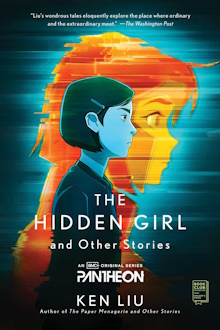I loved the Pantheon series and seeing as I’ve never read any of Ken Liu’s original fiction, I thought I’d check out the collection of short stories it came from. In fact, only three of the stories in this collection form the basis of the television series and the written form is very different. The rest are a mixed bag. Some explore alternative versions of similar ideas. Others are purely fantasy stories. My favorites are when he explores questions about identity in which the speculative fiction elements are almost incidental. There’s no real central theme to this collection however so it must have been composed of whatever work Liu had that was available and I have to say that on the whole, it isn’t a particularly brilliant book.
The three stories that were turned into Pantheon, “The Gods Will Not Be Chained,” “The Gods Will Not Be Slain” and “The Gods Have Not Died In Vain” share a common naming scheme, and it’s easy to guess what they mean by gods here. The events they describe do proceed roughly as shown in the television show and the plot is far simpler as there is no Caspian character and Maddie has very little agency. She is mostly a passive observer as the uploaded intelligences fight among themselves in a secret war. Other stories explore variations of a similar post-Singularity even if they aren’t strictly part of the same timeline. I actually like these more as they have more of a point beyond just introducing the concept of uploaded intelligences. One such example is “Staying Behind” which describes the lengths to which some will go to keep living as biological humans, convinced that being uploaded into a digital form means death or worse, being transformed into some demonic version of one’s self.
Then there are the generic science-fiction stories, set on no world in particular. “Real Artists” is good and especially topical given the recent explosion of what generative AI is capable of as it demonstrates how artists may one day be replaced. “Thoughts and Prayers” and “Byzantine Empathy” are kind of similar in that they are about manipulating public opinion. There are clever ideas in both but also some naivety. For example, I liked how the latter story is set up but then it devolves into a conflict between reason and emotions. It made me want to scream at the two characters because that’s not what they are disagreeing about at all! Other stories are so simple that it seemed hardly worth writing them down. “The Message” for example feels wrong twice over as it features an AI so intelligent and capable that it is indistinguishable from humans and yet the people in it are so dumb that they fail to take basic precautions when investigating an alien ruin.
Liu’s fantasy stories are entertaining at least and one of them is an excerpt to promote his Dandelion Dynasty series. I note that they all feel like science fantasy as opposed to magical fantasy. For example a flying creature needs to consume enough food and generate lift gas to fly. They’re okay and often have a vaguely Asian feel, but not anything I would actually buy to read. An interesting one is “Maxwell’s Demon” which can be fairly described as both science-fiction and fantasy. The title gives away what it’s about and I was rather disappointed that it’s such a straightforward treatment of a well-known idea. But I liked its examination of identity and how people aren’t just one single thing. In this instance the main character is an American woman of Japanese ancestry during the Second World War who isn’t American enough for the Americans, nor Japanese enough for the Japanese.
As another story about identity, it’s the very first one of the volume “Ghost Days” that is my favorite of the lot. It’s about a descendant of humanity who has been radically altered to survive in a hostile environment. She rails against her still human teachers who insist on teaching them about what their ancestors were like even though it is impossible for them to ever return to Earth. Then there’s “The Reborn” which is about how memory and identity are inextricably linked. The plot itself is predictable and the alien the story introduces is highly original. The Tawnin in it have physical bodies that live for a very long time but they periodically wipe their memories and hence create completely different personalities. In this way, they escape responsibility for the wrongs committed by their past selves as they were literally different people. I would have loved a full novel set in this world as it seems to me that Tawnin have weaponized this ability. Even if they really are different people, it’s awfully convenient for their civilization that they share similar interests and that’s something worth elaborating on.
There is enough good material in this collection that it’s worth reading but I’m not really impressed by Liu as a science-fiction writer. It’s like he has one decent idea to base each story around and that’s it, whereas a really good writer will have a succession of mind-blowing ideas even within one story. His worlds are incomplete or flawed in obvious ways, as for example why would the uploaded humans all be based in a single data center instead of being distributed across the planet? Why is energy use still a big deal when they can presumably harness solar energy and so on? I was surprised that Pantheon is actually better that its inspiration because it goes much farther and shows a dynamic world that changes in response to events. It’s possible that he’s better in his earlier collection of stories but I’m not very enthused right now.
